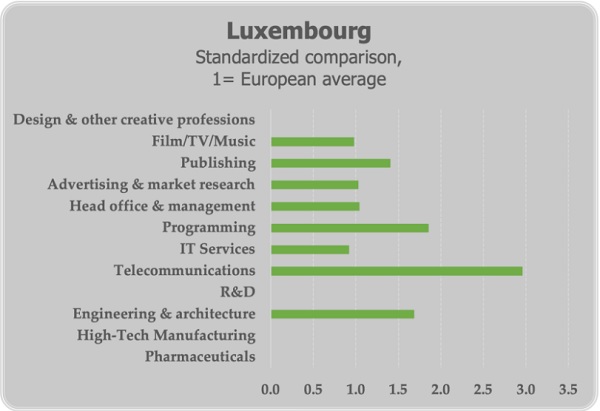 Credit: ECEPR
Credit: ECEPR
The European Centre for Entrepreneurship and Policy Reform (ECEPR) has issued a report which found Luxembourg to be amongst the European countries with most adults employed in so-called “brain business jobs”; a number three times as high as the European average.
The report found that, since 2014, the share of adults employed in brain business jobs in Luxembourg has increased by 11%. These are jobs in knowledge-intensive occupations, that are deemed of essential importance in the modern economy. This is a higher rate of growth than Switzerland, Denmark and France, but just below that of Sweden.
The index by ECEPR, with support from Nordic Capital, measured the share of the working-age population across Europe employed in knowledge-intensive enterprises, in 31 countries and 277 regions.
“The brain business jobs of Europe are increasingly growing in Southern and Eastern Europe. The capital regions of Southern Europe, including France, have 600 000 more brain business jobs than the Western European capital regions. Eastern European capital regions have twice as many brain business jobs compared to the Nordic capital regions”, explained Nima Sanandaji, Director of ECEPR.
Klas Tikkanen, chief operating officer at Nordic Capital Advisors, added: “There is a general trend in Europe in which those countries that have experienced the strongest growth of brain business jobs, per capita, tend to be those that have lower tax levels as share of GDP. Just above a third of the variation of growth rate in these knowledge-intensive jobs can be explained in the variance in the tax level. Competitive taxes are a key ingredient in fostering knowledge-intensive jobs growth”.
Among the working-age population in Luxembourg, 2.2% are engaged in the technology sector, with an additional 4.8% employed in IT and communications. Furthermore, 1.5% find work in advanced services, and 0.6% pursue careers in creative professions. Collectively, these brain business occupations constitute 9.2% of adults in Luxembourg, positioning the country in sixth place in a European ranking.
The prevalence of knowledge-intensive jobs is most pronounced in Switzerland, where a substantial 10.7% of the population is engaged in brain business occupations. Sweden reclaims the second spot, having been overtaken by Ireland in the previous year. In Ireland, 10.0% of adults are employed in brain business roles, nearly on par with Sweden's 10.1%.
The index assesses 277 European regions by analysing the proportion of adults working in brain business jobs, manufacturing industries, and professional services. In regions where there is a 10 percentage point higher concentration of the population employed in these high-value-creating sectors, the average unemployment rate is 2.1% lower compared to the typical European region.
In all the prior editions of this index, the Slovakian capital region of Bratislava has consistently held the top position for the highest concentration of brain business jobs per capita. However, in the current year's ranking, Budapest has ascended to the number one position, with Bratislava securing the second spot and Prague ranking third. The remaining regions in the top ten include Oberbayern, Paris, Stockholm, the Oxford region (Berkshire, Buckinghamshire and Oxfordshire), Copenhagen, London and Bucharest. Among the top ten regions, four are located in Eastern Europe, three in Western Europe, two in the Nordics, and one in Southern Europe.
In contrast to the broader European landscape, Luxembourg exhibited particular strengths in telecommunications, programming, engineering and architecture, according to the report. The proportion of adults engaged in telecommunications is three times greater than the European average. Nevertheless, Luxembourg falls behind in sectors like design, creative professions, research and development, and pharmaceuticals.
The full report is available on the ECEPR webpage https://www.ecepr.org/.








